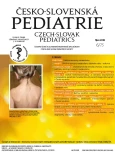-
Medical journals
- Career
Nutritional therapy in patients with inherited metabolic disorders
Authors: M. Floriánková; Š. Bláhová; M. Pencová; T. Honzík; P. Ješina
Authors‘ workplace: Klinika dětského a dorostového lékařství 1. LF UK a VFN, Praha
Published in: Čes-slov Pediat 2018; 73 (6): 395-407.
Category:
Overview
Most of inherited metabolic disorders are rare, but a number of these disorders increases and so does a number of diagnosed patients due to a newborn screening and a development of new analytic methods. Inherited metabolic disorders are mostly serious. Nutrition management has a significant role in a therapy of a part of these disorders, especially in so called small molecules disorders. It involves a regulated intake of a substrate, which metabolism is limited in a patient due to an enzymatic or a protein deficiency or functional disruption. Supplementation of lacking metabolic products and essential nutrients is also a part of a nutrition management. The goals of a nutrition management are to reach and maintain a normal level of all metabolites and a normal growth and development of a patient.
This article reviews the basic principles of a nutrition management of most often occuring inherited metabolic disorders, which are managible by a diet.
KEY WORDS:
nutrition therapy, inherited metabolic disorders, low protein diet, low fat diet, antihypoglycemic regiment, lactose-free diet, low fructose diet, low cholesterol diet, low plant sterol diet, ketogenic diet, low purine diet
Sources
1. Honzík T, Zeman J, a kol. Dědičné poruchy metabolismu v kazuistikách. 1. vyd. Praha: Mladá fronta a.s., 2016 : 1–278. ISBN: 978-80-204-4178-4.
2. Boyer SW, Barclay LJ, Burrage LC. Inherited metabolic disorders: Aspect of chronic nutritional management. Nutr Clin Pract 2015 August; 30 (4): 502–510.
3. Honzík T, Zeman J. Dědičné poruchy metabolismu v dětském věku. 1. vyd. Praha: IPVZ, 2013 : 1–96. ISBN: 978-80-87023-10-5.
4. Acosta PB (ed), et al. Nutrition Management of Patients with Inherited Metabolic Disorders. 1st ed. Sudbury, Massachusetts: Jones and Bartlett Publishers, 2010 : 1–476. ISBN-13 : 978-0-7637-5777-9.
5. Nützenadel W. Failure to thrive in childhood. Dtsch Arztebl Int 2011; 108 (38): 642–649.
6. MacLeod EL, Ney, DM. Nutritional management of phenylketonuria. Ann Nestle Eng 2010; 68 : 58–69.
7. Singh RH, Rohr F, Frazier DM, et al. Recommendations for the nutrition management of phenylalanine hydroxylase deficiency. Genet Med 2014; 16 (2): 121–131.
8. Singh RH, Cunningham AC, Mofidi S, et al. Updated, web-based nutrition management guideline for PKU: An evidence and consensus based approach. Mol Genet Metab 2016; 118 : 72–83.
9. Morris AAM, Kožich V, Santra S, et al. Guidelines for the diagnosis and management of cystathionine beta-synthase deficiency. J Inherit Metab Dis 2017; 40 : 49–74.
10. Fernandes J, Saudubray JM, van der Berghe G, et al. Diagnostika a léčba dědičných metabolických poruch. 4. vyd. Praha: Triton, 2008 : 1–607. ISBN: 80-738-7096-6.
11. Frazier DM, Allgeier C, Homer C, et al. Nutrition management guideline for maple syrup urine disease: An evidence-and konsensus-based approach. Mol Genet Metab 2014; 112 : 210–217.
12. Singh RH. Nutritional management of patients with urea cycle disorders. J Inherit Metab Dis 2007; 30 : 880–887.
13. Adam S, Almeida MF, Assoun M, et al. Dietary management of urea cycle disorders: European practice. Mol Genet Metab 2013; 110 : 439–445.
14. Van Calcar SC, Bernstein LE, Rohr FJ, et al. A re-evaluation of life-long severe galactose restriction for the nutrition management of classic galactosemia. Mol Genet Metab 2014; 112 : 191–197
15. Kishnani PS, Austin SL, Abdenur JE, et al. Diagnosis and management of glycogen storage disease type I: a practice guideline of the American College of Medical Genetics and Genomics. Genet Med 2014; 16 (11): 1–29.
16. Heller S, Worona L, Consuelo A. Nutritional therapy for glycogen storage diseases. J Pediatr Gastroenterol Nutr 2008; 47 (1): 15–21.
17. Goldberg T, Slonim AE. Nutrition therapy for hepatic glycogen storage diseases. J Am Diet Assoc 1993 Dec; 93 (12): 1423–30.
18. Brožová K, Hadač J. Ketogenní dieta. Neurol praxi 2013; 14 (2): 89–91.
19. Youngblom E, Pariani M, Knowles JW. Familial hypercholesterolemia. GeneReviews Seattle. https://www.ncbi.nlm.nih.gov/books/NBK174884, cit. 14. 3. 2018.
20. Nghiem-Rao TH, Patel SB. Investigating sitosterolemia to understand lipid physiology. Clin Lipidol 2013; 8 (6): 649–658.
21. Yoo E-G. Sitosterolemia: a review and update of pathophysiology, clinical spectrum, diagnosis, and management. Ann Pediatr Endocrinol Metab 2016; 21 : 7–14.
22. Floriánková M, Urbanová Z, Bláhová Š, a kol. Sitosterolémie: klinická, biochemická a molekulárně genetická charakteristika 3letého chlapce s významnou hypercholesterolémií. Čes-slov Pediat 2017; 72 (8): 495–503.
23. Merkens LS; Myrie SB; Steiner RD, et al. Sitosterolemia. GeneReviews – NCBI Bookshelf online. http://www.ncbi.nim.nih.goc/books/NBK131810/, cit. 3. 5. 2017.
24. Purevsuren J, Hasegawa Y, Fukuda S, et al. Clinical and molecular aspects of Japanese children with medium chain acyl-CoA dehydrogenase deficiency. Mol Genet Metab 2012; 107 : 237–240.
Labels
Neonatology Paediatrics General practitioner for children and adolescents
Article was published inCzech-Slovak Pediatrics

2018 Issue 6-
All articles in this issue
- Characteristic clinical features and laboratory findings of inborn errors of metabolism
- Phosphomannomutase 2 deficiency: clinical, biochemical and molecular analyses in 22 Czech patients
- A complex view of vitamin B12 deficiency in childhood
- Barth syndrome – case history
- Newborn screening of inherited metabolic diseases in the Czech Republic
- Nutritional therapy in patients with inherited metabolic disorders
- Lysosomal storage disorders – development of diagnostic process and treatment in Slovakia
- Czech-Slovak Pediatrics
- Journal archive
- Current issue
- Online only
- About the journal
Most read in this issue- Characteristic clinical features and laboratory findings of inborn errors of metabolism
- A complex view of vitamin B12 deficiency in childhood
- Newborn screening of inherited metabolic diseases in the Czech Republic
- Lysosomal storage disorders – development of diagnostic process and treatment in Slovakia
Login#ADS_BOTTOM_SCRIPTS#Forgotten passwordEnter the email address that you registered with. We will send you instructions on how to set a new password.
- Career

